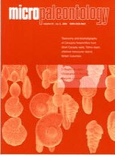
MICROPALEONTOLOGY
Scope & Guideline
Exploring the Depths of Microfossil Research
Introduction
Aims and Scopes
- Biostratigraphy and Paleoenvironmental Analysis:
The journal emphasizes the use of microfossils, particularly foraminifera and nannofossils, for biostratigraphic studies and paleoenvironmental reconstructions, providing insights into historical climate changes and geological events. - Taxonomy and Systematics of Microfossils:
A core focus is on the taxonomy and systematics of various microfossil groups, including foraminifera, radiolarians, and calcareous nannofossils, which contributes to the refinement of classification systems and understanding of evolutionary trends. - Paleoceanography and Climate Change:
Research published in the journal often investigates the implications of microfossil assemblages on paleoceanographic conditions and climate change, highlighting their role as indicators of past marine environments. - Interdisciplinary Approaches:
The journal encourages interdisciplinary research, integrating micropaleontology with sedimentology, geochemistry, and other fields to enhance the understanding of microfossils within broader geological contexts.
Trending and Emerging
- Climate Change and Environmental Impact Studies:
There is an increasing focus on understanding the impacts of climate change through the lens of microfossil assemblages, particularly in relation to oceanic events and environmental changes over geological time. - Multi-Proxy Approaches:
The journal shows a rising trend in the use of multi-proxy approaches that integrate various data sources (e.g., biostratigraphy, geochemistry, and sedimentology) to provide a more comprehensive understanding of paleoenvironments. - Discovery of New Species and Taxa:
A notable trend is the identification and description of new species and taxa, particularly among foraminifera and nannofossils, which highlights the ongoing exploration and refinement of micropaleontological diversity. - Technological Advancements in Micropaleontology:
Emerging themes include the application of advanced imaging techniques and molecular methods in micropaleontology, which enhance the understanding of microfossil morphology and genetic relationships.
Declining or Waning
- Focus on Older Geological Periods:
There has been a noticeable decrease in studies focusing on older geological periods, such as those from the Paleozoic era. Recent publications have shifted towards more recent geological times, particularly the Cenozoic. - Ostracod Research:
Research specifically centered on ostracods appears to be waning, with fewer dedicated studies and taxonomic revisions published compared to previous years, indicating a possible shift in research interest towards foraminifera and nannofossils. - Morphological Studies of Microfossils:
The emphasis on purely morphological studies of microfossils has decreased, as more researchers are adopting molecular and genetic approaches. This trend suggests a move towards more integrative techniques that combine morphological and molecular data.
Similar Journals

Palaeoworld
Decoding the Ecological Narratives of Our Planet's PastPalaeoworld is a leading peer-reviewed journal published by ELSEVIER, focusing on the dynamic and interdisciplinary fields of paleontology, ecology, and stratigraphy. Established in 2006, the journal aims to facilitate the dissemination of innovative research and significant discoveries that enhance our understanding of past life on Earth. With an impressive impact factor and categorized in the second quartile (Q2) for Ecology, Evolution, Behavior and Systematics, Paleontology, and Stratigraphy in 2023, Palaeoworld stands out in its commitment to high-quality scholarship. The journal is indexed in Scopus, ranking #23 in Paleontology and #14 in Stratigraphy, placing it within the top 20% of publications in these categories. As a valuable resource for researchers, professionals, and students alike, it provides unrestricted access to cutting-edge findings, detailed methodologies, and critical assessments of paleo-environmental data. This journal is not only a repository of knowledge but also a platform for advancing discussions that bridge past ecological patterns with contemporary issues.

RECORDS OF THE AUSTRALIAN MUSEUM
Championing Original Research in Natural and Cultural SciencesRecords of the Australian Museum is a leading journal in the fields of Animal Science, Ecology, History, and Museology, published by the renowned Australian Museum in Sydney, Australia. With a commitment to advancing knowledge and understanding of natural history and cultural heritage, this journal provides an essential platform for original research, reviews, and significant findings relevant to its diverse academic audience. The journal encompasses a broad scope, including studies in ecology, evolution, behavior, systematics, and the history of science, attracting contributions from leading scholars and professionals. Notably, it ranks highly in various categories, achieving a Q1 ranking in History and Museology, reflecting its impact and prestige within the academic community. Although it operates under a traditional access model, the journal ensures that its robust compilation of cutting-edge research remains vital to researchers, professionals, and students aiming to stay informed of the latest developments in their fields. With converging years of publication since 1983, Records of the Australian Museum continues to play a pivotal role in disseminating critical insights and fostering discussions that shape our understanding of both the natural world and our cultural heritage.

JOURNAL OF THE GEOLOGICAL SOCIETY OF INDIA
Bridging theory and practice in the realm of geology.JOURNAL OF THE GEOLOGICAL SOCIETY OF INDIA, published by Springer India, serves as a pivotal platform for researchers and practitioners in the field of geology. Established in 1979, this journal has been instrumental in advancing geological research throughout India, showcasing both regional studies and cutting-edge global research. With its Category Quartile ranking of Q3 in the geology category for 2023, and a significant Scopus rank of 171 among 321 journals in Earth and Planetary Sciences, it remains a respected source of scholarly activity. The journal is dedicated to the dissemination of original research articles, reviews, and case studies that encapsulate the dynamic scope of geological science, thus contributing to the understanding of geological phenomena. Although currently not offering open access, the journal maintains a commitment to high-quality scholarship and aims to engage a diverse readership, enhancing the knowledge and practice of geology across various disciplines.

PalZ
Showcasing Transformative Insights in PaleontologyPalZ is a prestigious academic journal in the field of Paleontology, published by Springer Heidelberg in Germany. With a long-standing history that traces back to its converged years from 1914 to 2024, this journal offers invaluable insights into the evolutionary dynamics and ecological relationships of past life forms. Holding a commendable impact factor and ranked in the Q2 category of Paleontology, it consistently showcases high-quality research that resonates within the scientific community, evidenced by its Scopus rank of #38 out of 113 in Earth and Planetary Sciences. PalZ is committed to open access, ensuring that its rich repository of scholarly articles is readily accessible for researchers, professionals, and students alike. By engaging with the journal, readers will encounter cutting-edge studies that are pivotal for advancing our understanding of paleobiology and the historical patterns of biodiversity.

Spisanie Na B Lgarskoto Geologichesko Druzhestov-Review of the Bulgarian Geological Society
Fostering collaboration in the pursuit of geological excellence.Spisanie Na B Lgarskoto Geologichesko Druzhestov-Review of the Bulgarian Geological Society, published by the BULGARIAN ACADEMY OF SCIENCE, serves as a leading platform for the dissemination of pioneering research and comprehensive reviews in the field of geology. With the ISSN 0007-3938 and E-ISSN 1314-8680, this esteemed journal underlines its commitment to advancing geological sciences, particularly pertinent to the Bulgarian context but with broader implications for global studies. While the journal does not currently offer open access options, its rigorous peer-review process ensures high-quality publications that enrich the geological literature. The journal aims to bridge the gap between theory and empirical research, fostering collaboration among researchers, professionals, and students. With its strategic location in Sofia, Bulgaria, it stands as a vital resource for those keen on exploring the complexities of Earth sciences and contributes significantly to the prestige of the Bulgarian geoscience community.
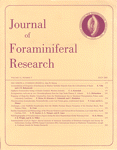
JOURNAL OF FORAMINIFERAL RESEARCH
Unveiling the Mysteries of Foraminifera and Their EnvironmentsJOURNAL OF FORAMINIFERAL RESEARCH is a premier academic journal published by the Cushman Foundation for Foraminiferal Research, dedicated to advancing the field of foraminiferal studies within the broader disciplines of paleontology and microbiology. Established in 1979, this journal has been a vital publication for researchers aiming to explore the intricate relationships between foraminifera and their environments, contributing to a deeper understanding of earth's history. With a Q4 ranking in Microbiology and a Q3 ranking in Paleontology as of 2023, it plays an essential role in shaping scholarly discourse in these areas. Although it currently does not offer open access, the journal remains a valuable resource for scientists, professionals, and graduate students eager to engage with contemporary research findings and methodologies. The subtle interconnections between foraminiferal research and broader ecological implications underscore the journal's commitment to fostering academic inquiry, making it an indispensable ally for those invested in the ongoing scientific exploration of our planet.
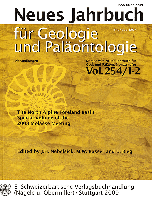
NEUES JAHRBUCH FUR GEOLOGIE UND PALAONTOLOGIE-ABHANDLUNGEN
Advancing Knowledge in Geology and PaleontologyNEUES JAHRBUCH FUR GEOLOGIE UND PALAONTOLOGIE-ABHANDLUNGEN, published by E SCHWEIZERBARTSCHE VERLAGSBUCHHANDLUNG, is a distinguished scholarly journal based in Germany that has made significant contributions to the field of Earth and Planetary Sciences with a particular emphasis on Paleontology. With its ISSN: 0077-7749, this journal provides an essential platform for researchers, professionals, and students to explore cutting-edge research and developments that enhance our understanding of geological and paleontological processes. Boasting a robust ranking of #67 out of 113 in Scopus for the category of Earth and Planetary Sciences and achieving a Q3 quartile ranking in Paleontology, it stands as a significant resource in the global academic community. Though not an open-access journal, it offers valuable insights from 1987 onwards, ensuring a comprehensive archive of high-quality research articles published from 1995 to 2024. Its scholarly impact continues to resonate, making it a vital reference point for advancements in the ever-evolving disciplines of geology and paleontology.

OFIOLITI
Advancing Earth Sciences Through Rigorous ResearchOFIOLITI is a prestigious journal dedicated to the field of geology, published by the Dipartimento di Scienze della Terra, Università di Firenze in Italy. With a notable history since its inception in 1978, the journal serves as a vital resource for researchers, professionals, and students seeking to explore and disseminate knowledge in Earth and Planetary Sciences. As a recognized publication with an impressive Q2 quartile ranking in the 2023 category of Geology and a Scopus rank of #155/321, OFIOLITI strives to promote innovative research and insights across a broad spectrum of geological studies. Although it currently does not offer open access, its commitment to high-quality peer-reviewed content ensures that each issue enriches the academic discourse and nurtures the scientific community's understanding of geological processes and phenomena. By bridging theoretical frameworks with practical applications, OFIOLITI plays an essential role in advancing scientific inquiry and education in geology.
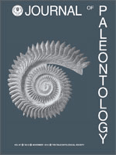
JOURNAL OF PALEONTOLOGY
Exploring the Depths of Earth's HistoryJOURNAL OF PALEONTOLOGY, published by Cambridge University Press, is a leading scholarly journal dedicated to the field of paleontology, featuring a broad scope that covers fossil studies, evolutionary biology, and earth history. With an ISSN of 0022-3360 and an E-ISSN of 1937-2337, this esteemed journal serves as an essential platform for researchers, professionals, and students to disseminate cutting-edge research findings and insights in paleontological science. The journal holds a significant position within its category, ranking Q2 in the 2023 quartiles and achieving a Scopus rank of #51 out of 113 in Earth and Planetary Sciences – Paleontology, placing it in the 55th percentile of its field. Although it does not currently offer open access options, JOURNAL OF PALEONTOLOGY has been a critical contributor to advancing knowledge from its inception in 1979 through to 2024. Its dedication to rigorous research ensures it remains an indispensable resource for those vested in the understanding of ancient life and ecosystems.
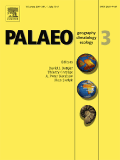
PALAEOGEOGRAPHY PALAEOCLIMATOLOGY PALAEOECOLOGY
Illuminating the Path from Palaeoecology to Present-Day InsightsPalaeogeography, Palaeoclimatology, Palaeoecology, published by Elsevier and accessible via ISSN 0031-0182 (print) and E-ISSN 1872-616X (online), stands as a pivotal journal in the fields of Earth-Surface Processes, Ecology, Evolution, Behavior and Systematics, Oceanography, and Paleontology. With an impressive Impact Factor and ranking in the top quartile (Q1) across multiple categories, this journal facilitates cutting-edge research that explores the intricate relationships between past climates, environments, and ecosystems. Its scope encompasses a wide array of studies focusing on the geological and biological records that inform our understanding of contemporary ecological dynamics. Key objectives include advancing knowledge in palaeoecology and enriching discourse around climate change through rigorous research contributions. The journal's dedicated commitment to publishing high-quality, peer-reviewed articles makes it an invaluable resource for researchers, professionals, and students alike, providing insights essential for probing the factors shaping our planet's history. Positioned in the Netherlands and continuing its tradition of excellence since 1965, the Palaeogeography, Palaeoclimatology, Palaeoecology journal remains at the forefront of interdisciplinary research that bridges the past and future.